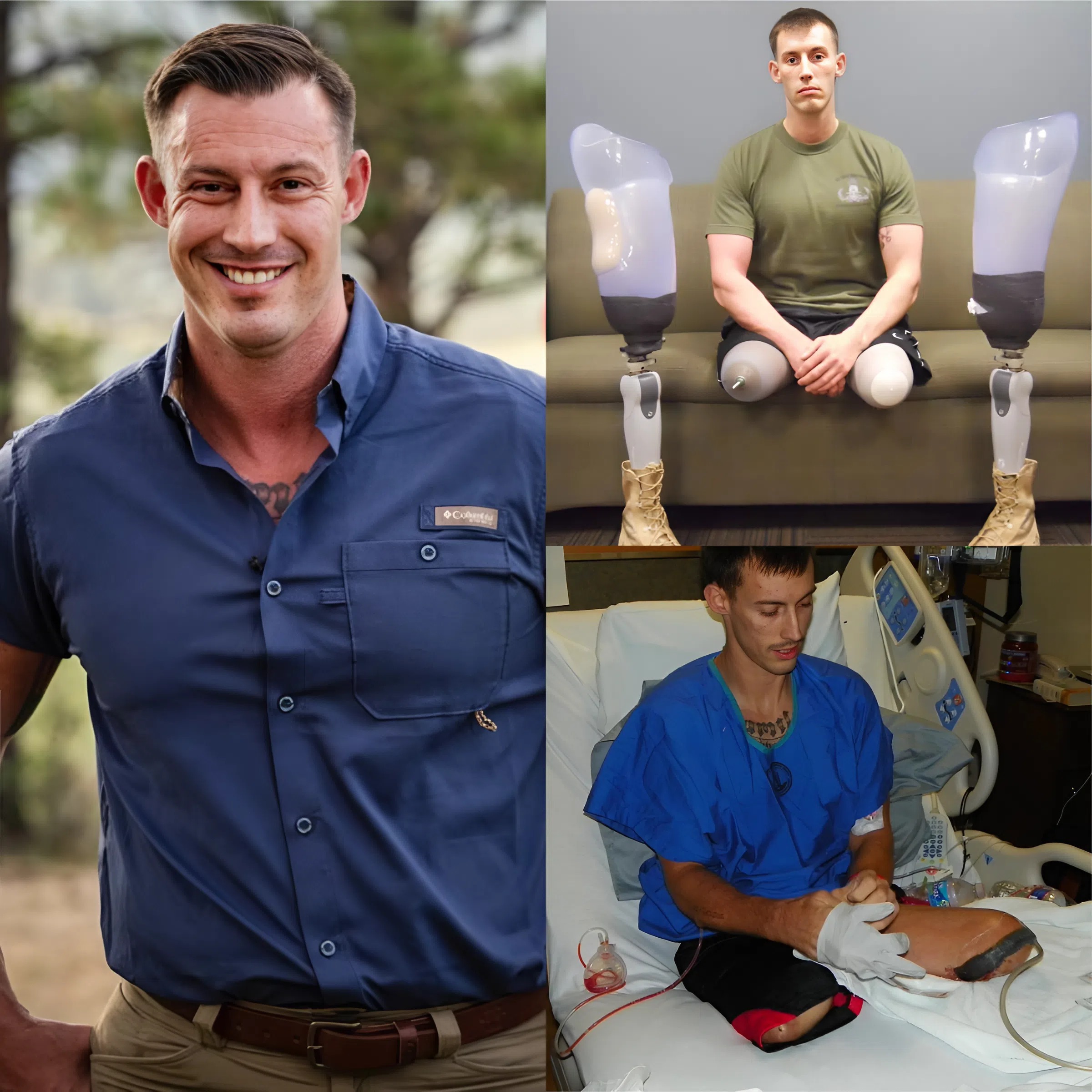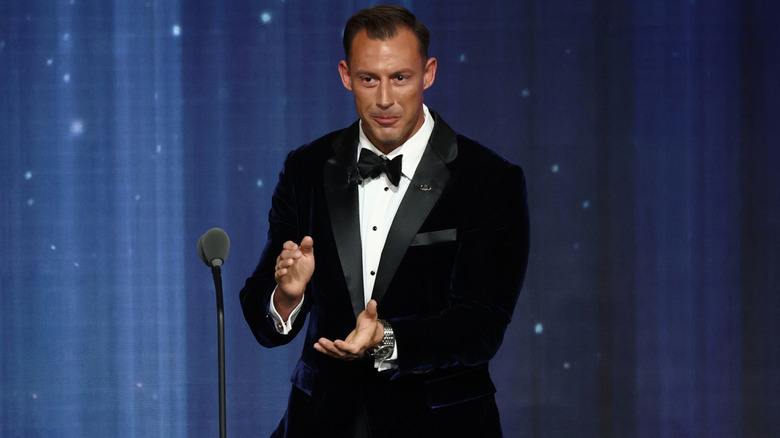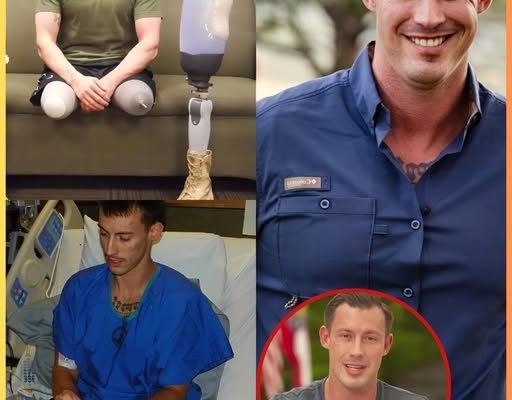In an emotional and inspiring milestone, Fox News’ Johnny Joey Jones is commemorating thirteen years since the devastating battlefield injury that forever changed his life. Looking back on his journey, Jones reflected, “I chose to live, not just survive.” His words struck a powerful chord with fellow veterans and supporters across the country, reminding them that perseverance, courage, and an unshakable willpower have been the foundation of his recovery. This moment is not only about overcoming the physical scars of war—it stands as a powerful tribute to the resilience of the human spirit.

A Soldier’s Defining Moment
Thirteen years ago, a single moment on a battlefield in Afghanistan reshaped the entire course of Johnny Joey Jones’ life. Serving as a bomb technician with the U.S. Marine Corps, Jones was tasked with one of the most dangerous responsibilities in modern warfare—defusing improvised explosive devices (IEDs). It was during one of those missions that tragedy struck.
A blast ripped through the air, instantly taking both of his legs above the knee and severely injuring his right forearm. In that single instant, his future hung in the balance. The chaos, the pain, and the uncertainty that followed would have broken many men. But for Jones, that was the beginning of a new chapter—one defined not by loss, but by purpose.
As he later recalled, “That day didn’t end my life. It changed it. I lost a part of myself, yes, but I gained a mission—to live fully, to serve others, and to inspire those who think they can’t.”

From Battlefield to Broadcast
After months of painful rehabilitation at Walter Reed National Military Medical Center, Jones faced the daunting challenge of rebuilding his identity. Many veterans returning from war carry invisible wounds—PTSD, survivor’s guilt, and the crushing weight of trying to find meaning beyond the uniform.
For Jones, the path forward began with storytelling. His passion for communication and his desire to advocate for his fellow veterans led him into media. Step by step, he transitioned from military service to public service—this time, through the power of words and television.
Today, Johnny Joey Jones is one of Fox News’ most recognizable contributors—a commentator, motivational speaker, and advocate for veteran affairs. Known for his candid honesty and humor, Jones brings authenticity to discussions on patriotism, sacrifice, and perseverance. His insights go beyond politics; they are reflections born from lived experience.
“Every scar has a story,” he once said on air. “Mine just happen to be visible. But the real battle isn’t what you lose—it’s what you choose to do afterward.”

The Choice to Live
The phrase “I chose to live, not just survive” encapsulates everything Jones stands for. It’s not merely a slogan—it’s a life philosophy forged in pain and tempered by gratitude.
In the years since his injury, Jones has dedicated himself to helping others who face adversity, whether they are veterans, first responders, or ordinary Americans dealing with hardship. He’s a frequent speaker at schools, corporate events, and military organizations, where his message resonates deeply: resilience is not about pretending things are easy—it’s about deciding to keep going when they’re not.
He reminds audiences that adversity does not discriminate, and neither does hope. “We all get hit by something,” he tells them. “Maybe it’s not a bomb—maybe it’s cancer, addiction, heartbreak, or failure. But no matter what it is, we can always choose how to respond.”
His ability to connect his personal tragedy to universal struggles has made him a symbol of hope for thousands. Social media platforms often light up with veterans sharing their own stories of survival after hearing Jones speak, using his words as a reminder that pain can be transformed into purpose.
Family, Faith, and Fortitude
Behind the public figure is a man deeply rooted in family and faith. Jones often credits his wife, Meg, and their children for being his anchors. In interviews, he has described the moments when his son saw him for the first time after his injury—how the innocence and love of a child reminded him that life’s value isn’t measured by physical ability, but by presence and heart.
Faith has also been a cornerstone of his recovery. He frequently acknowledges that his strength did not come from sheer will alone, but from a belief that his life still had meaning beyond the battlefield. “God gave me another chance,” he said during a recent veterans’ event. “I don’t take that lightly. Every day I wake up is a gift, and I try to honor that gift through service.”
That sense of gratitude has propelled him into multiple philanthropic efforts. Jones works closely with veteran support organizations, including the Boot Campaign, where he previously served as Chief Operating Officer. His mission has been to raise awareness about the physical and emotional needs of those who have served—and to help bridge the gap between civilians and military communities.
A Voice for Those Who Served
As a Fox News contributor, Jones has leveraged his platform to shed light on the challenges faced by America’s veterans—issues like access to mental health care, homelessness, and reintegration into society. But unlike many commentators, his voice carries the weight of experience. When he speaks about the cost of war, it isn’t theoretical; it’s personal.
In one memorable broadcast, he said:
“We can debate policy all day, but at the end of the day, the faces of those who served are what matter most. They’re not statistics. They’re sons, daughters, brothers, and sisters who gave something they can’t get back.”
That authenticity has earned him respect across the political spectrum. While Jones often appears on conservative platforms, his message transcends ideology. It’s about human resilience, sacrifice, and national unity—a reminder that freedom comes at a price, and gratitude should never fade.
The Ripple Effect of Courage
Thirteen years after the explosion that could have taken his life, Johnny Joey Jones continues to inspire others to redefine what it means to overcome. His story has been featured in documentaries, podcasts, and countless interviews—but perhaps the most profound impact lies in the quiet moments, when a wounded veteran messages him saying, “Your story saved me.”
He doesn’t see himself as a hero, though many would disagree. “I’m not special,” he often says. “I just made a choice—to live.”
That choice has become a ripple that continues to touch lives across the country. Schools invite him to speak to young students about courage. Companies bring him in to remind employees about the value of teamwork and perseverance. Families of fallen soldiers find comfort in his words, knowing that even in loss, there can be meaning.
Looking Ahead
Now, as he celebrates thirteen years since his injury, Jones is focused not on what he lost, but on what lies ahead. He’s working on new projects aimed at empowering veterans and their families, expanding his media presence, and mentoring others who want to use their stories to inspire change.
In a world often distracted by negativity, Jones’ message is refreshingly simple yet profound: life is precious, struggle is universal, and strength is a choice.
“I don’t measure my life by what I can’t do anymore,” he said recently. “I measure it by who I’ve become, and who I can help along the way.”
His journey from the battlefield to the broadcast studio, from despair to determination, reminds us that adversity can forge greatness. Johnny Joey Jones stands not just as a symbol of military courage, but as a living example of how pain can lead to purpose—and how the human spirit, when tested, can emerge stronger than ever.
A Legacy of Hope
As he marks this thirteenth anniversary, Jones’ reflection—“I chose to live, not just survive”—resonates far beyond the military community. It speaks to anyone who has ever faced loss, doubt, or fear. His life is proof that tragedy does not define us; our response to it does.
The scars, both seen and unseen, are not reminders of what was broken, but of what was rebuilt. And in Johnny Joey Jones’ story, we see a reflection of humanity at its best—brave, grateful, and unyielding.
Thirteen years on, his journey continues—not as a tale of war, but as a living anthem of triumph through adversity.



